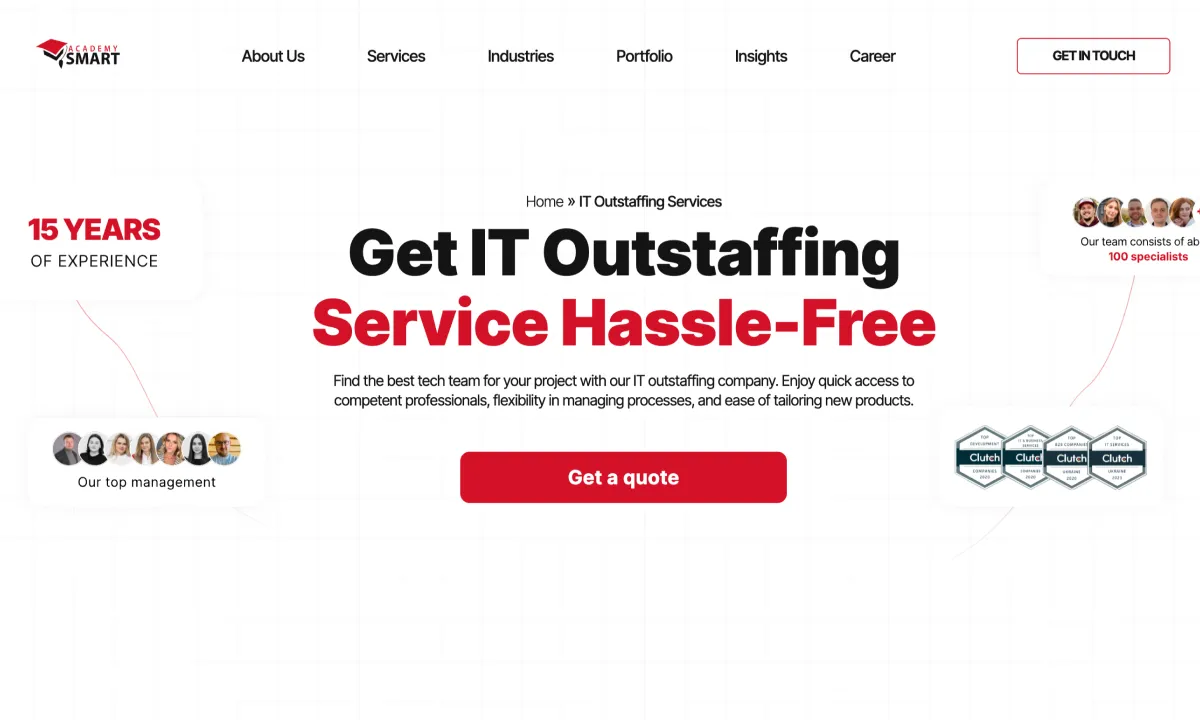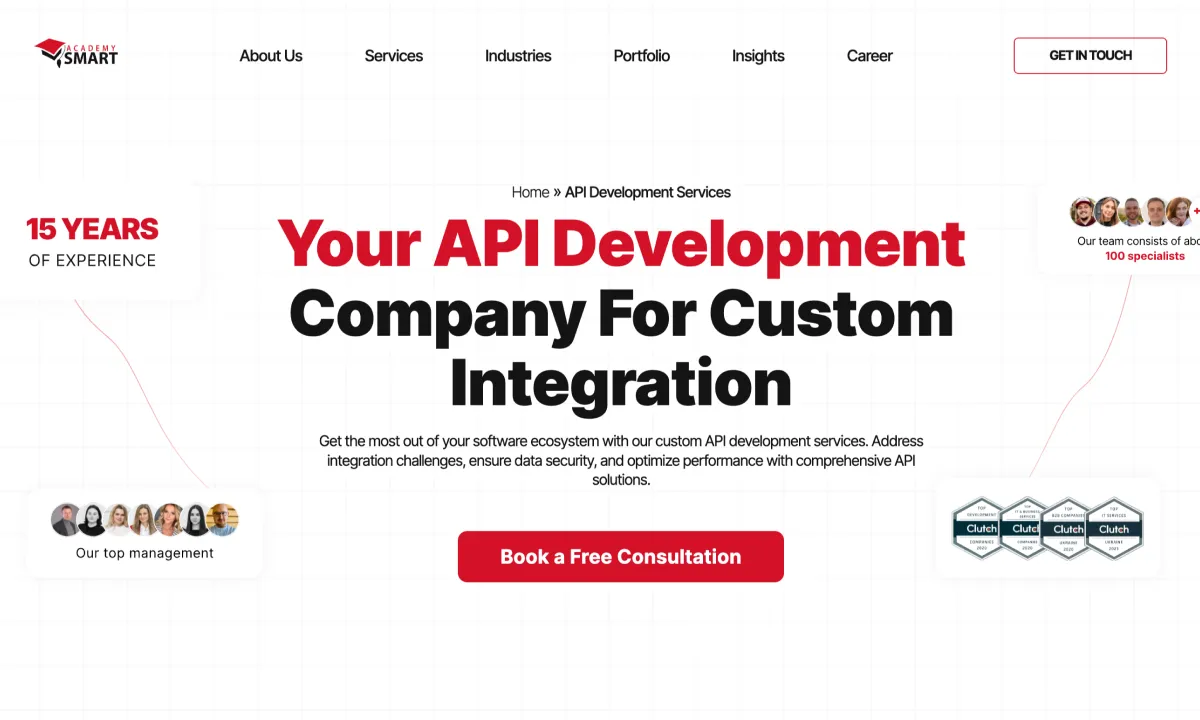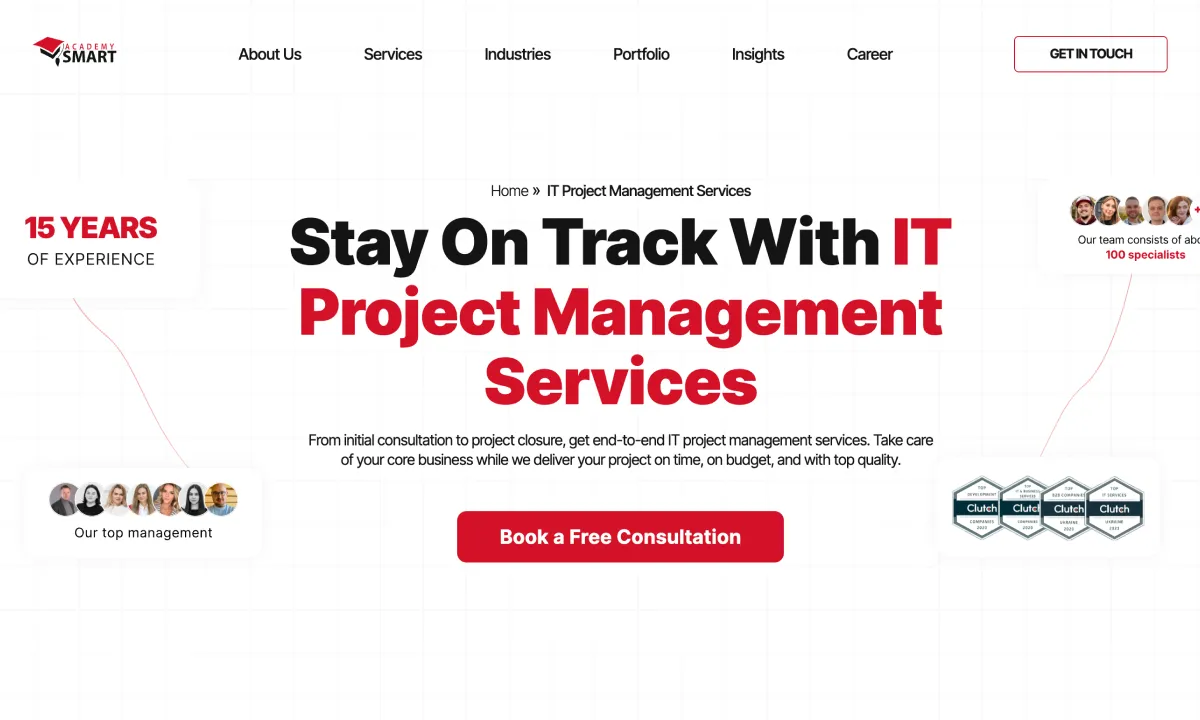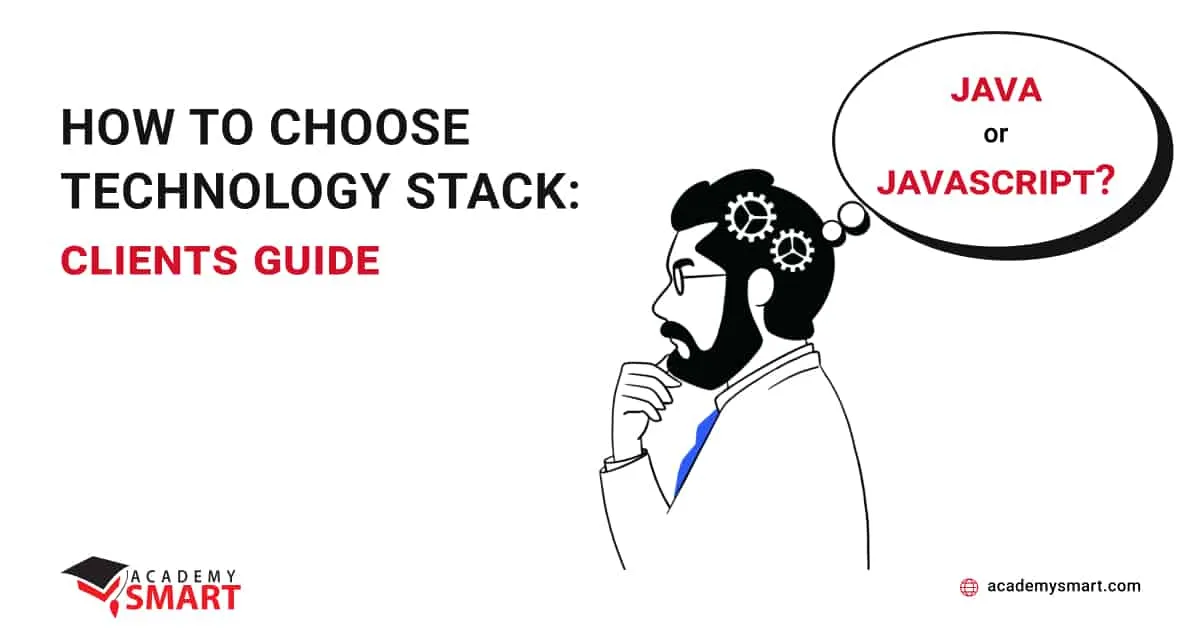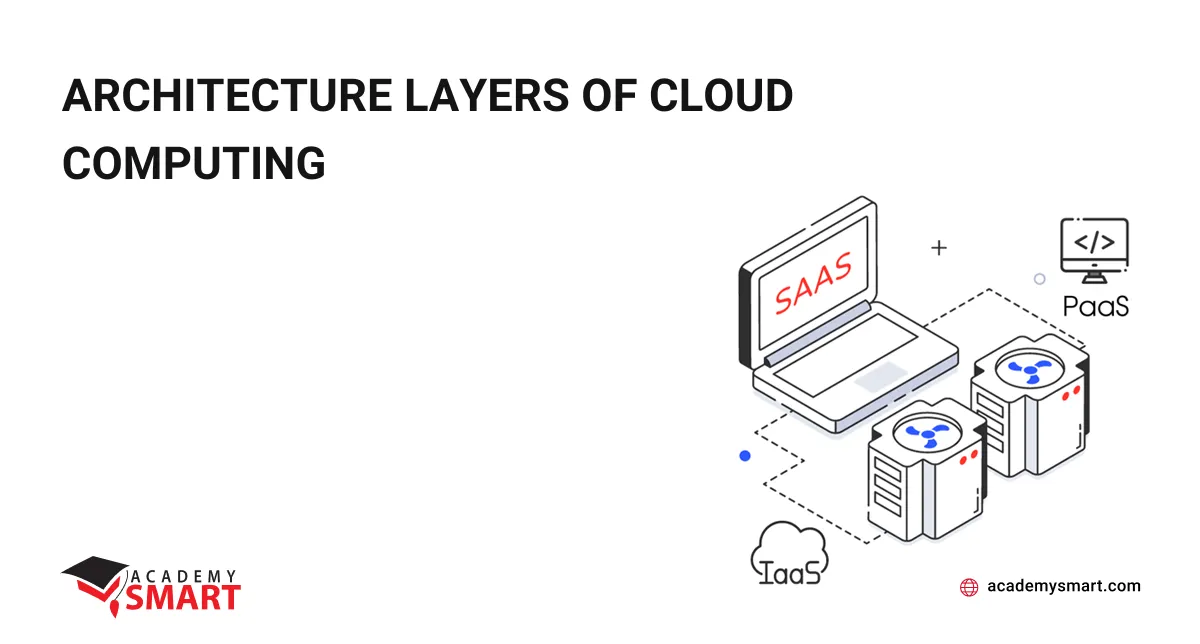
6 benefits of Custom Software Development
Contents
The modern software market offers a wide variety of ready-made solutions designed to meet the needs of your business. As a rule, such software products include only the most typical features in demand in the industry or, on the contrary, offer a redundant toolkit not only in functions but also in the cost of its license.
Practice shows that each enterprise is unique in its way, and only sometimes a software product out-of-the-box can cover its actual requests, be as flexible as required, or be as cost-effective as desired. On the other hand, the imbalance of processes, which includes low-performance software, hinders the growth of the enterprise and its profit. For this reason, there is a good alternative that, with a thoughtful and reasonable approach, can maximize the potential of a business. And it is custom software development.
This article is intended to reveal the essence of this solution and highlight the main benefits of custom software development.
What is Custom Software Development
Custom software development creates applications tailored to meet an enterprise’s unique requirements. It involves designing, coding, and testing software products from scratch, addressing specific challenges, and achieving definite goals.
Custom software is the alternative when off-the-shelf or existing solutions don’t suit productivity or earnings expectations. Customized app is designed to fit seamlessly into the current business processes and can be scaled or modified as needed. It allows companies to have complete control over the software’s features, functionality, and user experience.
Businesses can give a gold key to their specific workflows, industry requirements, and growth plans by opting for custom software development. It can automate processes, improve efficiency, enhance productivity, and provide a competitive advantage. It also eliminates the need to work around limitations or compromise on functionality.
So, what is custom software development profit? It is the way to long-term cost savings. While the initial investment may be higher than off-the-shelf applications, white-label software eliminates the further expensive license fees, ongoing subscriptions, or customizations of generic software. It also reduces the reliance on third-party providers and minimizes the risks associated with changes in vendor support or discontinued apps. At last, the company owns its application and manages its future growth.
Not surprisingly, custom software development services have always been in demand, especially among enterprises that value purposefulness, performance, security, and their brand. Our portfolio showcases excellent examples of white-label apps created by Academy Smart’s developers.
Custom Software Development: 6 benefits
Of course, creating an original business app comes with challenges, most notably the cost of building it from scratch and the availability of a skilled development team with industry expertise.
On the other hand, the flexibility and variety of possibilities of customized solutions have several undeniable advantages, which outperform third-party software out-of-the-box in terms of cost-efficiency. Let’s look deeper at these advantages of custom software development.
Targeted solution to business challenges
Custom software development explicitly addresses an enterprise’s unique needs and requirements. This approach focuses on building applications with only the necessary functionality, avoiding unnecessary features and complexities that can hinder its efficiency.
Off-the-shelf software often comes with a wide range of features that may not be relevant or essential to a particular organization. But custom software development allows businesses to prioritize their needs and concentrate on building critical functionalities for their operations. That results in a more efficient and focused solution that aligns closely with the business processes and workflows. Moreover, the modular architecture of targeted solutions enables the addition of new features or integration with new technologies without disrupting the entire system. Customized software remains relevant and adaptable to future changes, saving businesses from out-of-box software’s limitations.
Businesses rely on various technologies and tools to carry out their operations. Custom software is designed to communicate with all existing program and hardware systems, like customer relationship management (CRM) platforms, enterprise resource planning (ERP) systems, data analytics tools, servers or data storages. That’s why seamless integration with other technical systems is another critical aspect of custom solution development. It ensures smooth data flow and eliminates manual data entry or the need for multiple software interfaces. It enhances productivity, reduces errors, and improves overall operational efficiency of the company.
Improving efficiency and quality
Custom software is tailored to the specific workflows of the organization, optimizing processes, automating industry-specific repetitive tasks, and reducing errors. This way, businesses can save time and resources, increasing productivity and profits.
Another advantage of custom software is the ability to personalize the user experience. Off-the-shelf software often has a generic interface and limited customization options. With custom software, businesses can design user interfaces that align with their branding and provide a user-friendly experience. Personalization of the user experience enhances usability, reduces training time, and increases user adoption rates. The white-label software can be optimized for specific user roles and workflows, ensuring employees can work more efficiently and effectively, feeling unity with the company.
Businesses can deliver products or services by developing apps that focus directly on customers’ unique needs. Custom software can incorporate features that cater to clients requirements, improving their experience and satisfaction. For example, a custom CRM system can provide a personalized approach to customer interactions, enabling businesses to understand better and meet customer needs. Or customized LMS delivers a better e-learning experience, providing an individual student’s learning path considering the training program and the real speed of information consumption.
By the way, off-the-shelf software may not always meet evolving industry trends or specific business requirements. With custom software, businesses have the flexibility to incorporate new features or make modifications to the software as needed. This agility allows enterprises to stay competitive, respond to market changes timely, and seize new opportunities.
Manageability of product development
One of the decisive benefits of custom software development is the complete predictability and manageability of its creation and support processes. First, it is a clear understanding of the goals and challenges the software must cope with. No out-of-the-box software can realize them completely and in the form required particularly in your case.
Next, a detailed roadmap clearly defines the timing and parameters for feature releases, updates to existing code, and integration of third-party solutions. Of course, providers of ready-made software collect feedback from their customers, partly considering them, and often have plans for further delivering their product. However, they don’t coincide with your business plans so often, both in terms of the release time and the content of updates. While when custom software is created, only you choose priorities and guide the development of your product in the proper direction without delays and overpayments.
Unlike off-the-shelf software, you can quickly scale its operation by attracting new computing power and third-party services to the extent necessary. It is essential to understand that at a certain stage, the cost-efficiency of expanding the capabilities of customized apps begins to significantly exceed any ready-made solutions since it eliminates the consumption of unnecessary digital and financial resources.
Finally, developing your own software gives you a partner who has excellent knowledge of the product and personally lays the groundwork for its future growth. You can be sure that your business plans will be implemented professionally and on time. Moreover, whether it’s in-house or a remote dedicated development team doesn’t matter. How to establish such cooperation, we described in detail in the article How to Hire an Offshore Development Team.
Software security and reliability
Custom software development offers enhanced application security and reliability, providing businesses greater control and mitigating potential risks compared to off-the-shelf software. There are several reasons why custom software is often considered more safe.
Firstly, custom apps are built with security in mind from the start. Security measures are incorporated into the software architecture, coding standards, and implementation during development by default. That includes encryption algorithms, user authentication mechanisms, access controls, and secure data storage.
Secondly, your development team conducts rigorous testing and quality checks to ensure the application is free of bugs, vulnerabilities, and performance issues. The ability to perform comprehensive testing enables businesses to deliver a more reliable and robust software solution.
With off-the-shelf software, businesses are dependent on the vendor’s release cycle for updates and fixes. That can lead to delays in addressing security vulnerabilities or bugs. In contrast, with customized solutions, the owner controls the update process and can promptly prioritize and implement security patches, bug fixes, and feature enhancements, reducing the risk of potential exploits or disruptions.
Another reason white-label app is more safe and reliable is the absence of widespread knowledge about its inner workings. Off-the-shelf software is used by many companies, making it a prime target for hackers. In contrast, custom software is unique, so attackers have to spend more time and effort understanding the app’s architecture and security measures, making it less attractive.
Lastly, custom software development allows enterprises to comply with industry-specific regulations and security standards. Different business areas have unique security and compliance requirements that off-the-shelf software may not fully meet. Custom software will adhere to these regulations and implement the necessary security controls and protocols, ensuring data privacy, confidentiality, and integrity, and, this way, be entirely legal.
Independence from third-party providers
Without repeating what has been said above, customized software products have greater agility in implementing changes or enhancements. With off-the-shelf software, modifications or customizations are limited to the vendor’s provision. It can be restrictive and may not fully align with the business’s unique processes or requirements. In contrast, custom software can be easily adapted and scaled as the industry evolves, providing the flexibility to accommodate changing needs.
When using out-of-the-box solutions, companies are at the mercy of the vendor’s decisions regarding product support and updates. Businesses may face significant challenges if the vendor discontinues support for a particular software version or even the entire product. That can leave them with outdated software that lacks necessary features, security patches, or bug fixes. In contrast, custom software gives owners complete control over the software’s lifecycle. They can maintain and support the software for as long as needed, ensuring that it continues to be actual.
Ready-made software often comes with licensing agreements that can be costly, especially for companies with specific needs or large user bases. As the business grows or its requirements change, license fees can become exorbitant, straining the budget and making the service unprofitable. On the other hand, custom software significantly reduces licensing costs using only necessary.
Profitable intellectual property
When a business invests in custom software development, it retains ownership of the intellectual property rights associated with that application, safeguarding it from unauthorized use or replication by competitors. This intellectual property can be a valuable asset, as it can be licensed or sold to other organizations operating in the same industry or related sectors. It can lead to long-term financial gains and a competitive advantage in the market.
Custom applications that provide unique functionality or address specific industry challenges can differentiate the company from competitors. That attracts new clients who value the white-label software’s specialized capabilities. It also enhances the business’s reputation as a technology leader and innovator.
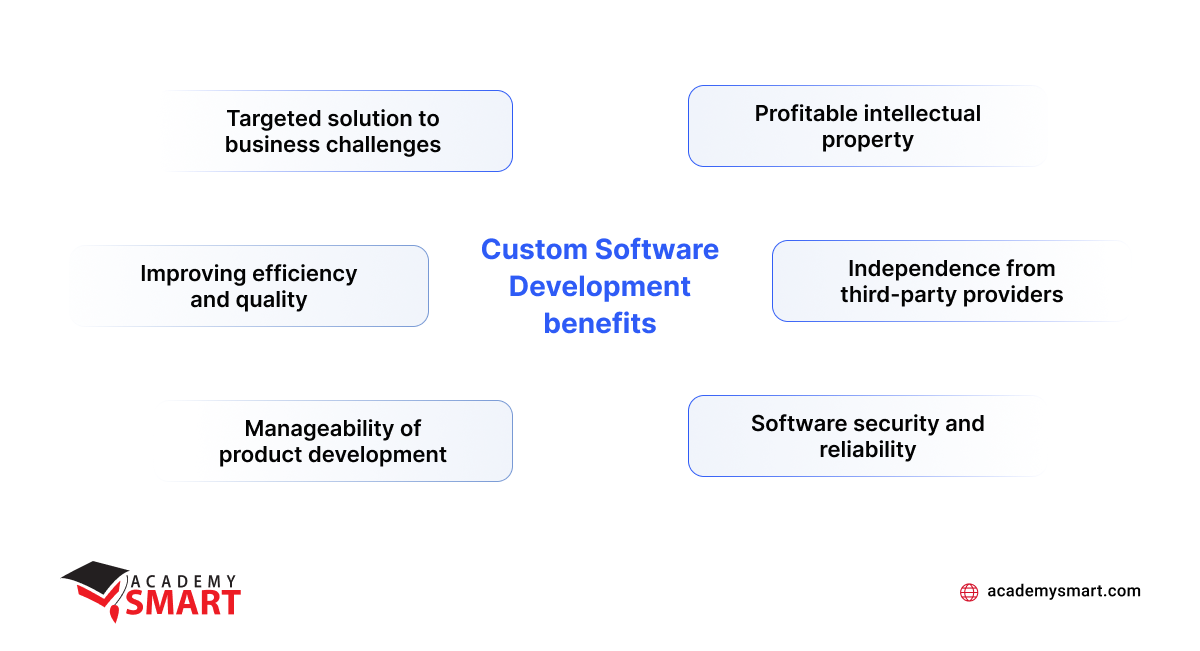
The main benefits of custom software development
What you need to know before ordering Custom Software
Creating a custom software product is a complex, multi-step process that requires rigorous planning, specialized knowledge, industry skills, and specific resources.
First of all, a company that has decided to develop its application must clearly articulate the list of goals that it intends to achieve with the future application and make a list of tasks that the program must be able to perform. When compiling them, the customer must consider the following:
- initial project size;
- its ability to scale;
- the number of users and the system of their roles;
- user devices and other technical environments;
- compatibility with industry standards;
- data security requirements;
- processes to be automated;
- the need to integrate third-party digital services;
- wishes for the user interface.
As a result, customers of custom software should have a clear vision of their product and how to use it.
The second important point is the availability of a development team capable of translating the customer’s vision into program code to be productive and cost-effective for the owner. Of course, programming skills, industry experience, and developers’ creative flexibility matter here.
Fortunately, the modern digital world no longer limits us to distances. There is a reasonably large selection of qualified IT teams for enterprises, one of them is Academy Smart, with various cooperation and payment models. For helpful tips on which one to select, see our article Outsourcing vs Outstaffing: What To Choose.
Of course, the organization of the collaboration between the customer of the software to order and the development team must be specified in all details, including the product specification, delivery time, and the cost of development and support services. The customer should remember to protect his intellectual property and have an appropriate non-disclosure clause in the contract. Suppose all counter-objections are resolved, and all stakeholders are satisfied with the contract terms. In that case, you can start the most important part of the joint work – create your white-label software app and promote it to the market.
Yes, custom software development is a difficult and responsible decision, but the one who makes it gets opportunities others can only dream of. It is an exciting adventure, full of sudden obstacles and unexpected insights inherent in creating an original software product. Get inspired by examples of custom software applications from our portfolio, and think, is it time to develop your own?
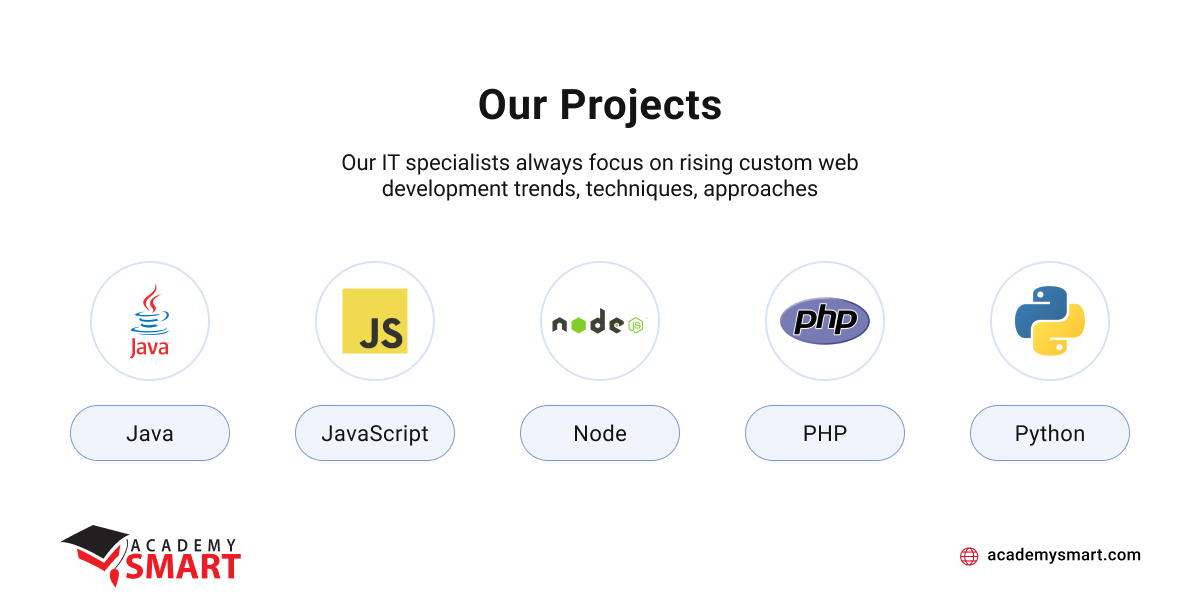
Portfolio of Academy Smart’s development team
How Academy SMART can help you
For more than 13 years, Academy Smart has been providing services for creating, configuring, and supporting enterprise custom software from various business areas. We have over 100 delivered large and complex applications for clients from 14 countries in Europe, America, South Africa, and the Middle East. We professionally create custom software as an outsourcing company. On top of that, our IT experts work as outstaffers daily to develop and upgrade our clients’ apps as part of their internal teams.
Cooperation with us is beneficial for you for many reasons:
- we specialize in high-quality enterprise custom software development;
- our full-stack development team includes more than 100 qualified specialists with diverse expertise;
- we carefully study your needs and offer the most cost-efficient ideas;
- we work flexibly and conscientiously, creating clean and reliable code for the years.
As soon as you feel the timeliness of creating a white-label software solution for your business, contact us to get a reliable and proactive partner for the long term.
Advantage of Custom Software: Frequently Asked Questions
What is the Advantage of Custom code?
It is purposefully created for your business to develop and prosper, providing all the necessary technical tools.
Why Custom Software is better than off-the-shelf?
You own your safe software product with all the required features, is updated depending on your demands and fully meets the needs of your business and customers. Our cases demonstrate examples of successful original custom applications.
Book a free consultation

Reach out to start talking today!

